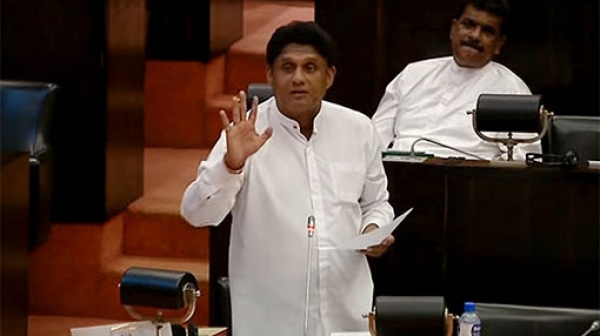Explaining its position on the resolution on Sri Lanka adopted by the UNHRC yesterday, the main opposition the Samagi Jana Balawegaya (SJB) said it reflected the utter failure of the government.
A statement issued by the SJB said, "1) The Samagi Jana Balawegaya notes the adoption of a resolution on Sri Lanka at the 46th session of the United Nations Human Rights Council.
2. The SJB stands for the principles of justice and accountability, and the protection and promotion of human rights. The SJB believes that human rights and the Rule of law are universal and remains deeply committed to it.
3. The SJB acknowledges that the end of the armed conflict in 2009 was an important turning point in the country’s history. Many people have sacrificed their lives so that the country could have peace. The SJB is committed to safeguarding Sri Lanka’s unity, sovereignty, territorial integrity, political independence, and to the full and meaningful implementation of the 13th amendment to the Constitution, which will entail maximum devolution within a unitary state. However, lasting peace requires reconciliation among all the communities of the country through addressing the effects and the causes of the war.
4. The resolution on Sri Lanka at the 46th session of the Human Rights Council is a direct result of the government’s major failures. It was brought about by the government’s foreign policy failure, and its current failure in safeguarding human rights and democracy in Sri Lanka.
a. Foreign policy failure: The present government has managed its foreign relations extremely irrationally. Instead of embarking on a careful and thoughtful process of diplomatically convincing the world that Sri Lanka is willing to take its human rights obligations seriously, it embarked on an obnoxious and intransigent campaign. The government lacks coherence, competence, and good faith in dealing with the international community. This dysfunctional approach to foreign relations is one of the main reasons countries that once supported Sri Lanka are now no longer its allies.
A fresh approach is needed to better manage Sri Lanka’s foreign relations. Competent professionals with foreign affairs expertise should be guiding Sri Lanka’s foreign policy.
b. Failures in human rights and democracy: The resolution was adopted in the Council mainly because of the present government’s failure to respect and protect human rights and democracy in the country. The text of the resolution makes that very clear.
The SJB condemns the present rapid deterioration of the human rights situation in Sri Lanka, and the racist, xenophobic, and discriminatory policies of the present government. It also condemns the systematic assault on Sri Lanka’s democratic institutions.
The freedom of people to speak freely is being thwarted, as vocal critics of government are being targeted for their views. Politicians, lawyers, media personnel and activists are being punished for their political activities, and human rights work. Communities, including environmental activists, are not being permitted to air their grievances freely, and are being compelled to take to the streets.
The people’s representatives in opposition parties are being systematically targeted through a process designed to strip them of their civic rights, and disqualify them from contesting elections. The SJB fears that the country is being primed to become a one-party state, or worse – a despotic or tyrannical state, where the democratic choice of the people will be destroyed.
A fresh approach is needed to ensure human rights and democracy in Sri Lanka. If Sri Lanka emerges as a country that respects human rights and democracy, it would certainly not be on the agenda of the UN Human Rights Council.
5. The SJB is committed to an internationally credible, independent domestic accountability mechanism. It intends to build on past credible initiatives such as the Lessons Learnt and Reconciliation Commission (LLRC) and later the Paranagama Commission. Both these bodies found that certain violations had taken place, and needed to be investigated. The LLRC in particular made recommendations on measures needed to promote reconciliation in the country. Regrettably, the present government has not implemented these recommendations. Instead, it has promised yet another new commission nearly 10 years after the LLRC report was published. This inaction has directly led to increased international pressure on Sri Lanka."










